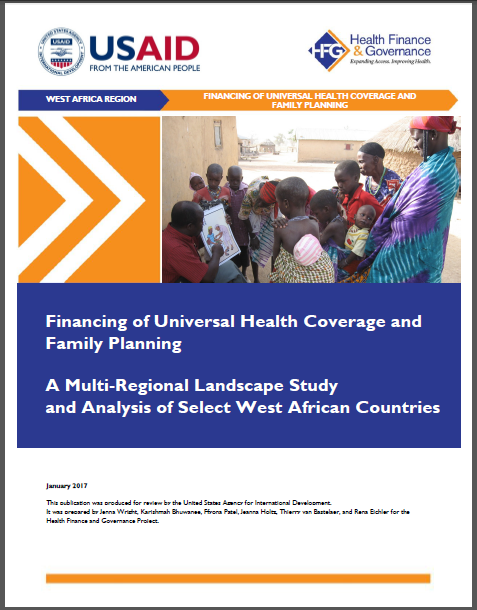Financing of Universal Health Coverage and Family Planning: A Multi-Regional Landscape Study and Analysis of Select West African Countries – Introduction
Categories: Family Planning and Reproductive Health, Health Finance, Health Insurance (CBHI, SHI), Publications, Universal Health Coverage
Resource Type: Report
 Authors: Jenna Wright, Karishmah Bhuwanee, Ffyona Patel, Jeanna Holtz, Thierry van Bastelaer, Rena Eichler
Authors: Jenna Wright, Karishmah Bhuwanee, Ffyona Patel, Jeanna Holtz, Thierry van Bastelaer, Rena Eichler
Published: January 2017
Resource Description: Recognizing that a healthy population promotes economic development, resilience, and strength, many governments have started pursuing a universal health coverage (UHC) agenda. The international community, national governments, and private organizations and individuals are converging on the principle that universal access to family planning is a goal worthy of increased financial investment. Improved access to family planning is also important for a country’s economic development, and it helps countries improve key population health outcomes for mothers, newborns, and children.
The reality of limited resources for health care has brought increased scrutiny of how health care is financed. To reach UHC, governments are looking to pursue more and better spending mechanisms for health care and to promote financial protection for households. While there is no single or perfect model for financing health care, the health policy community can draw on international experience to identify best practices.
The purpose of this report is to present findings of a landscape study of observed trends and lessons learned from fifteen countries across multiple regions. We conducted detailed analyses of eight countries in West Africa: Benin, Burkina Faso, Cameroon, Guinea, Mali, Niger, Senegal, and Togo (“core countries”). We reviewed the health financing landscapes of seven additional countries at various stages of achieving UHC to draw lessons learned and inform potential strategies: Ethiopia, Ghana, Indonesia, Kenya, Malaysia, Nigeria, and South Africa (“reference countries”).
Parties interested in the report may include Ministries of Health or national UHC agencies, regional governments, UHC stakeholders in the West Africa region, the United States Agency for International Development / West Africa Regional Health Office and country Missions, and the private sector.



